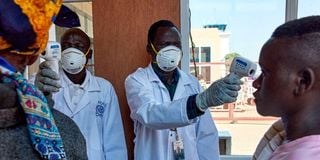African countries warned to keep vigilance on Covid

Passengers from an international flight are screened for their temperature at Juba International Airport in Juba, South Sudan, at the height of the Covid-19 pandemic outbreak in January 2020.
Global aviation and health agencies, including the World Health Organization (WHO) and Africa Centres for Disease Control and Prevention (CDC), have warned African countries against relaxing Covid-19 protocols, saying the world is not out of the woods yet.
The experts also urged African countries to deploy public health officers in all international airports to review the screening of all passengers. Dr Miriam Nanyunja, WHO Regional Advisor for Risk Management and Preparedness, said public health officers in airports would help screen passengers and manage public health emergencies.
“It’s critical to have public health officers stationed at airports to work with facility officers,” said Dr Nyanyuja, a public health expert. Speaking during the ninth Africa regional meeting of the Collaborative Arrangement for the Prevention and Management of Public Health Events in Civil Aviation (Capsca) in Mombasa, the experts said the Covid-19 protocols were essential to control and manage any medical emergencies.
The four-day meeting (June 6-9), Dr Nanyuja told Nation, was meant to review “the lessons learned from the Covid-19 pandemic” and strategise “on how we can work together to better prepare the world for the next pandemic and manage public health emergencies involving the aviation sector in the future.”
Dr Nanyunja said that when WHO Director-General Tedros Ghebreyesus announced in May that Covid-19 was no longer considered a public health emergency of international concern, most people thought it meant the end of the disease.
“It is the complete end of the acute phase. But Covid-19 is still with us and we need to continue to follow the safety protocols. We need to set up the systems that we have been using for Covid-19 surveillance and integrate it into our normal health surveillance system to continuously monitor the cases,” said Dr Nanyunja.
Integration
Dr Nanyunja, who is also a team leader at the WHO Emergency Centre in Nairobi, said the management of Covid-19 cases must be integrated into regular health care. She said vaccination against the virus should be included in routine immunisation programmes. The medical expert advised African countries to ensure that enhanced screening at all airports is maintained.
Ms Emily Atuheire, acting Surveillance Coordinator for Africa CDC, urged African leaders to work together to strengthen health systems and staff and build local capacity to ensure the availability of medicines and medical supplies needed to respond to public health emergencies.
Health Cabinet Secretary Susan Nakhumicha said Kenya had made significant and impressive progress in strengthening its functional capacities in emergency coordination, collaborative surveillance, clinical care, risk communication and community engagement.
She commended the governments of Uganda and Tanzania for successfully containing and declaring the end of the Ebola and Marburg virus disease outbreaks on 11 January 2023 and 21 March 2023 respectively.
The minister said Capsca provides an opportunity to review responses to the Covid-19 pandemic, Ebola virus disease, Marburg virus disease and cholera, among many other public health events that occur from time to time in the region.
Kenya Airports Authority Operations and Safety Manager Harrison Machio said the outbreak of Severe Acute Respiratory Syndrome in 2003 led the International Civil Aviation Authority Organisation to come up with the Capsca forum. The experts are deliberating on measures to be taken to proactively deal with future pandemics and ensure that the aviation sector is not affected.





